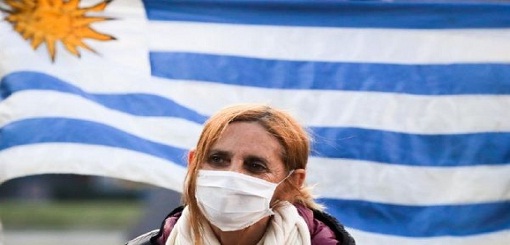Vaccination began last Monday in Uruguay, two days after personnel considered essential were immunized. The South American nation is vaccinating its population with doses of CoronaVac from the Chinese laboratory Sinovac, which will be administered first to teachers, the military, police and firefighters.
The plan aims at vaccinating 30,000 people per day, as president Luis Lacalle Pou marks one year in office. Uruguay is one of the last countries in the region to start its rollout.
"Today we have a fundamental card to face this scourge and it is to have the necessary amount of vaccines already committed to achieve immunity for all those over 18", said Minister of Health Daniel Salinas, in a pr ess conference.
ess conference.
Brazil launched Amazonia 1, the first satellite entirely made in Brazil
The Amazonia 1 satellite, the first made entirely in Brazil, was launched early from India, and will be used to monitor deforestation in the Amazon.
The Brazilian National Institute for Space Research (INPE) celebrated the "successful launch of Amazonia 1, carried out this Sunday from the Satish Dhawan Space Centre, in Sriharikota, India", international news agencies reported.
Amazonia 1 will be the third satellite to join the Real-Time Deforestation Detection (Deter) system, it weighs 637 kilos and is 44.4 meters long, and will supply images every five days.
For the first time in Peruvian history, a court ruled in favor of a dignified death
Peruvian law does not provide for the right to a dignified death, but a constitutional court has authorized euthanasia for psychologist Ana Estrada on the basis of an interpretation of fundamental rights, local press reported.
The 43-year-old woman has been suffering from a degenerative disease for 30 years and the judges have ruled that those who carry out euthanasia will not be prosecuted for "mercy killing", as established in Perú's Criminal Code. "We have reached the goal," said Estrada about the ruling, and emphasized that her fight was "personal freedom".
This is a historic ruling in Peru for being the first of its kind. "It is not about wanting to die or making an apology for death, on the contrary, to continue until the last chapter of my life with my way of thinking, of developing myself, as I have always done, making my own decisions. I wanted it to be like this and it is being fulfilled", said the woman.
Judge Jorge Ramirez Niño de Guzman supported his decision by considering that the rights to "dignity, autonomy, free development of her personality and the threat of not suffering cruel and inhuman treatment" were taken into consideration. Estrada has suffered since she was 12 from an irreversible disease that atrophies and inflames the muscles, called polymyositis, and according to her blog, she has had to use a wheelchair since she was 20 years old.
Argentina and Chile strengthen their exchange of agricultural products
Argentina and Chile are strengthening their bilateral exchange of agricultural products. According to information released by its Ministry of Foreign Affairs, Argentina opened its market to the import of dirty sheep wool from Chile to be processed in plants of Patagonia.
The SENASA animal health authority and its Chilean counterpart agreed on protocols for the exchange.
This Implies that the wool must be free of scab and other diseases. It also means that the wool must not have been stored for more than 30 days in the exporting country without being exposed to potential sources of parasitic infection. The measure opens the possibility of a greater development of the Argentine wool industry.
The World Trade Organization considers a temporary suspension of patents on COVID vaccines
A proposal to temporarily suspend the intellectual property rights of vaccines against the coronavirus, which would allow to increase their production and guarantee a more equitable distribution in the planet, began to be debated this Monday at the general council of the World Trade Organization (WTO).
There is strong resistance coming from the European Union (EU), Switzerland and the United States, where large pharmaceutical groups are based, and amid increasingly massive demands for vaccines coming from poor and underdeveloped countries.
The text proposes to agree to a temporary derogation to some of the obligations, so that any country can produce vaccines without rights concerns.






